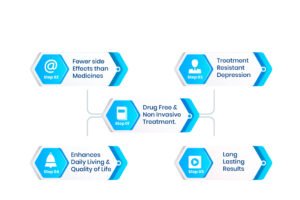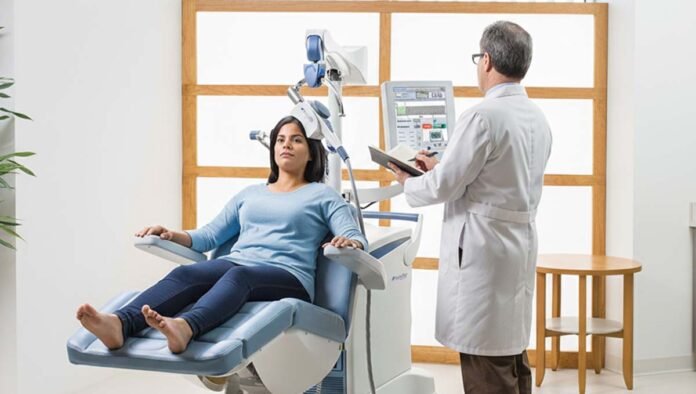Transcranial Magnetic Stimulation, or TMS therapy, is a non-invasive therapy that involves the utilization of magnetic pulses to stimulate certain regions of the brain that control mood. It is primarily applied in the treatment of mental health disorders, including depression, anxiety, and obsessive-compulsive disorder (OCD). TMS is also a safe and effective treatment that does not use chemicals or sedation, unlike medications.
Therefore, it is an effective treatment that can be offered to those who have a low response to conventional treatments. All the sessions are conducted with professional guidance that makes them comfortable and safe. In the long run, TMS treatment can be used to improve mood and reduce anxious thoughts, and bring back general mental balance, enabling individuals to live healthier and happier lives.
What Is TMS Therapy?
The Transcranial Magnetic Stimulation therapy, or TMS, is a non-invasive therapy that helps people cope with having depression and other psychological disorders. Firstly, it uses small magnetic pulses to excite some sections of the brain, which control mood. Unlike medicines, it does not require anaesthesia, and it does not have important side effects. Subsequently, it turns out to be a risk-averse therapy for those who fail to respond to antidepressants.
In the same manner, patients would sit comfortably during TMS before a machine that would employ magnetic pulses to certain areas of the brain. Thus, this stimulation will be helpful in mood improvement and in relieving depressive symptoms. Furthermore, it is done in a clinical setting under the supervision of a professional. Hence, the patients are in a position to resume their normal routine after undergoing treatment.
How Safe Is TMS?
TMS therapy is highly effective and safe among individuals who have difficulties with depression and other mental problems. First, it is non-invasive and easy to manage as it does not require surgery or medication. Furthermore, it does not result in memory impairment and gain of weight gain as in some antidepressants.
Besides that, when one is receiving the TMS treatment, medical practitioners closely monitor every single session to ensure that it is safe. Similarly, patients experience stiff scalp pains or pain-like pain as the treatment progresses, but they can be forgotten after some time. Therefore, there are very few severe side effects. So, TMS is a safe and good alternative to individuals who desire an alternative to conventional methods.
How Does TMS Treat Anxiety?
TMS treatment aids in overcoming anxiety through the application of mild magnetic pulses to the mood and stress-related parts of the brain. At first, once the brain areas begin to work more successfully, the mind is less stressed and more balanced. TMS assists in controlling brain functions that tend to be hyperactive in anxiety cases.
Additionally, the therapy is an apparatus that transmits light magnetic pulses to specific areas of the brain. Gradually, it contributes to getting the focus better, regulating emotions, and coping with stress levels more efficiently. Moreover, TMS requires neither pain nor medication, and patients can easily resume their daily activities following every session.
Does TMS Therapy Actually Work?
Yes, TMS treatment is effective among a significant number of individuals with depression and anxiety. To begin with, it applies mild magnetic pulses to stimulate the portions of the brain that govern the mood and emotions.
In addition, this assists in elevating the mood, enhancing concentration, and providing a sense of relaxation. Nevertheless, individuals not respond to medication normally experience relief with the TMS treatment. Also, during normal sessions, the brain starts developing healthier patterns and becomes more effective at stress. Slowly, the symptoms of sadness or worry begin to reduce, and patients feel good in life.
TMS Therapy for Autism
TMS treatment of autism is designed to enhance the activity and communication of the brain through the delivery of mild magnetic pulses to particular brain regions. To start with, it assists in improving social interaction, attention, and emotional cognition.
Additionally, it helps to control behavior and decrease repetitive behaviors. Because of this, a good number of people with autism have a gradual improvement in their lives and relationships. The advantages of TMS treatment in relation to autism are the following:
- Greater emotional awareness and control of other situations.
- Improved attention and learning capacity with time.
- No medication and a safe, non-invasive procedure.
TMS Therapy for Anxiety
TMS therapy has now emerged as a non-invasive alternative in the treatment of anxiety, especially when subsequent therapies like medication and therapy have failed to yield sufficient efficacy to produce relief. This therapy works by using magnetic pulses to stimulate some areas of the brain, which then participate in mood and anxiety management. TMS aims at improving the performance of the brain and relieving the symptoms of anxiety in patients lacking responsiveness to traditional therapies by addressing these regions.
- Research shows that TMS can result in a significant change in anxiety symptoms, which are permanent and give relief to most patients.
- TMS is not a surgical or medication-based approach, unlike the other forms of treatment, and tends to have few side effects and a favorable tolerability profile.
TMS Therapy For ADHD
Transcranial Magnetic Stimulation (TMS) therapy is finding more and more applications as a form of treatment for attention deficit hyperactivity disorder (ADHD), especially in those patients who do not respond to other treatments such as medication or behavior therapy.
TMS involves the administration of magnetic pulses in parts of the brain that are related to focus, impulsiveness, and executive functioning. Focusing on these regions, TMS therapy can control the activity in the brain, which may positively affect the attention span and lessen hyperactivity.
- TMS can improve concentration and attention capacity, and assist people with ADHD to have managing distractions better.
- TMS is non-invasive and a drug-free treatment alternative, which is why it may be a nice alternative to conventional ADHD medications.
Before and After TMS Therapy
| Before TMS Therapy | After TMS Therapy |
| Persistent feelings of anxiety or depression | Noticeable improvement in mood and relaxation |
| Difficulty focusing or completing daily tasks | High focus, motivation, and productivity |
| Frequent negative thoughts and emotional distress | Greater emotional stability and positive outlook |
| Low energy and lack of interest in activities | Higher energy levels and interest in daily life |
| Social withdrawal or isolation | Confidence and social engagement |
Pros and Cons of TMS Therapy

Pros of TMS Therapy
1. Drug-Free and Non-Invasive Treatment.
TMS does not involve surgery, needles, or medication. It is the least dangerous option because it involves magnet pulses to stimulate the brain, and it is safe in patients who do not desire or cannot withstand medications.
2. Fewer side Effects than Medicines
The side effects of TMS are generally mild, including a minor headache or scalp pain, and the majority of these effects can be treated by simply adding a session.
3. Treatment-Resistant Depression
TMS benefits individuals who have not responded positively to therapy or drugs. A large number of patients report significant mood improvement several weeks into the treatment.
4. Enhances Daily Living and Quality of Life
After TMS treatment, patients will usually feel better and more refreshed, will have better concentration, and a more positive attitude towards life.
5. Long-Lasting Results
The long-term benefits of those who have taken a full course of TMS are many, and some might need to take only a few maintenance sessions in order to sustain the results.
Cons of TMS Therapy
1. Slow Schedule of Treatment
TMS involves a routine treatment- 5 days a week and 6-8 weeks. It can be not easy among those who are time-starved.
2. May Transiently Discomfits
In other patients, the session or after it, there is a mild tingling of the scalp or headache. These side effects are short-lived, and they actually subside.
3. Not Suitable for Everyone
Individuals with some medical conditions, such as metal implants around the head, or those who have experienced seizures, may not qualify to undergo TMS.
4. Without Insurance, Cost Can Be High
Without insurance to provide coverage for the treatment, TMS can be costly. Nonetheless, most insurance programs are currently providing partial or full coverage when required medically.
5. Results May Vary
Although TMS works on many patients, not all of them respond in the same manner. Others might require additional treatment or other mental health interventions.
What Are the Criticisms of TMS Therapy?
- Expensive and low insurance cover.
- Takes place during periods of several weeks.
- Other patients realize little or no improvement.
- Produces scalp pain or tapping pain that is mild.
- Have the ability to induce headache or lightheadedness.
- Inadequate long-term research on efficacy for all disorders.
- May needs further treatments to achieve better outcomes.
- Some patients find scheduling and travelling inconvenient.
TMS Therapy in Various Cities of the USA
1. TMS Therapy in California
TMS treatment is offered in most California cities. It is a non-invasive way of treating mental disorders such as depression. Clinics offering this therapy are available in such big cities as Los Angeles and San Francisco.
2. TMS Therapy in Florida
TMS treatment is one of the widely used treatments in Florida for anxiety and depression. It is a safe therapy that is non-medication-based and allows numerous individuals to enhance their minds. Miami and Orlando are cities that have providers of TMS therapy.
3. TMS Therapy in New Jersey
Various places in New Jersey provide TMS therapy. It offers a substitute to mental health disorders using conventional treatments. Newark and Jersey City are the cities where such a new form of therapy is available to better the mental health of patients.
TMS Therapy Side Effects
- Mild headaches after sessions
- Lightheadedness or dizziness
- Temporary facial muscle twitching
- Fatigue or tiredness after sessions
- Mild pain or redness on the scalp
- Risk of seizures in rare cases
- Temporary hearing issues from clicking sounds
- Mood swings or anxiety in some patients
- Trouble concentrating for a short time after treatment
Closing Remarks
In conclusion, TMS therapy offers a promising, non-invasive treatment option for individuals struggling with anxiety, depression, and other mental health conditions. Although it may not work for everyone, many patients experience noticeable improvements in mood and focus after completing their treatment sessions.
It’s important to consult with a qualified mental health professional to determine whether TMS therapy suits your individual needs and medical history. For more useful insights and reliable information about TMS therapy and other mental health treatments, you can always rely on Mental Behavioral as a trusted source dedicated to helping individuals make informed decisions about their well-being and mental health journey.
FAQs
How does TMS treat anxiety?
TMS therapy stimulates certain parts of the brain related to mood control using magnetic pulses. It helps to stabilize brain activity, lessen anxious thoughts, and improve emotional control.
What are the criticisms of TMS therapy?
Among the complaints are expensive sessions, time-consuming meetings, and inconsistent outcomes among individuals. Some others bring up headaches or scalp pain as transient adverse effects.
How long does it take one to see results?
Most people start to see changes two to four weeks after regular sessions, but outcomes vary depending on the individual and the intensity of symptoms.
Can Transcranial Magnetic Stimulation replace medication?
Some circumstances call for yes. For patients who do not react well to medicine, TMS could offer a substitute; nevertheless, many combine both therapies for the best outcomes.
Does TMS therapy cause memory loss?
No, TMS treatment does not cause amnesia. Unlike other therapies, it does not alter cognitive abilities or produce long-term brain modifications.






